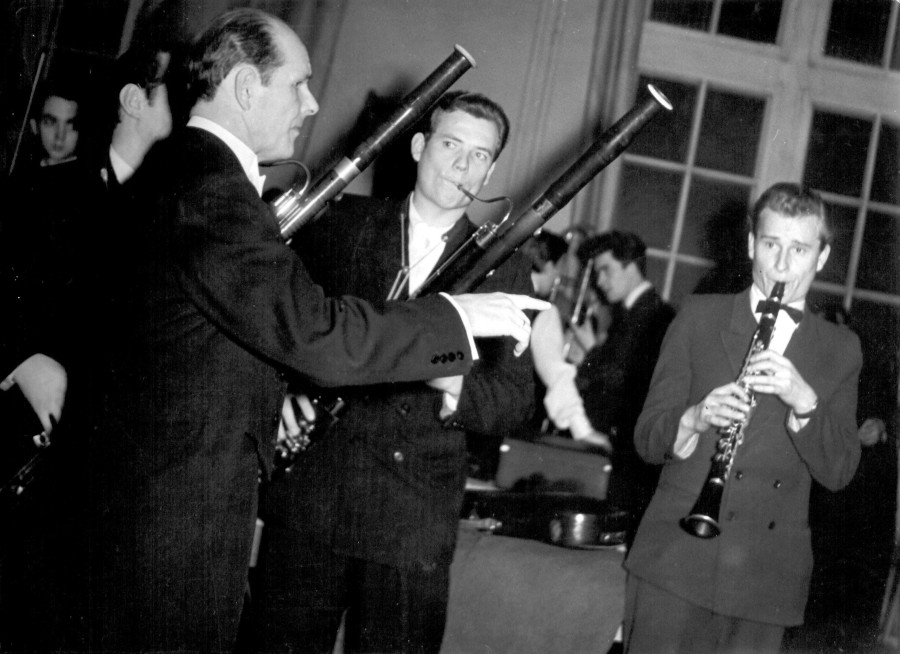Wrocław makes a nightmarish impression [...] of the home where someone left,” noted Maria Dąbrowska in her diary in February 1950.
“There is little and sluggish traffic on the streets. People who were wearing poorer clothes than two years ago, were sad, silent, gloomy. Private shops get closed down one by one.” The city seemed to look like a “capital turned into a poor village”. Fortunately, this poverty was a refuge for great art.
In the 1950s, artists of the highest class performed with the Wrocław Symphony Orchestra – the American pianist Julius Katchen (a respected Brahms interpreter), the violinist Rosa Fayn and the Austrian conductor Kurt Rapf. But the exceptionally warmly welcomed group were the laureates and jurors of the Chopin Competition, including Lev Oborin. It was he who won the laurels in the first competition, organized in 1927. “Bolshevik pianists were in the West for the first time, and they could see no end to their enjoyment of Warsaw. They appeared clothed proletariat-style. Unkempt heads, parting collars, crumpled sweatshirts,” Juliusz Kaden-Bandrowski vented his bitterness. Oborin himself “first appeared in thick boots, a shapeless coat and a slippery tie,”, but – as the future juror of the competition admitted – “his Chopin performance was excellent. So what to do?”
So what to do? Listen and worship. The winners of the Chopin Competitions were once treated like rock stars. The French pianist Bernard Ringeissen, who over time became the favourite of the Wrocław audience, came to the capital of Lower Silesia as the winner of the 4th place in the 5th edition of the competition. “To this day, after the concerts, older people come to me and show me my autograph from 1955. It is touching, because at that time I had a different, youthful handwriting. However, the most important memories I have in my heart are my secret garden. There was so much noise around me! I couldn’t normally go out on the street, calmly get in the car, enter the hotel,” he recalled in an interview with Albert Gawot (Gazeta Wyborcza, 2002). People applauded at the sight of the French pianist, stood up from the tables when he entered the cafe. “Perhaps for Greta Garbo […] it was the bread and butter. For me it is an amazing memory,” admitted Ringeissen.
With even greater applause, the Wrocław audience welcomed the Polish winner of the 5th Chopin Competition, Adam Harasiewicz, whom Jarosław Iwaszkiewicz admired in his diary: “Where does this phenomenon come from? Culture, charm of personality, speaks French ... And what a charm, a wonderful boy.” The newspapers wrote about Harasiewicz: “The swashbuckling and passionate temperament of this pianist shone in the Concerto in E minor with rich splendour and panache.”
There were more such “phenomena” in Wrocław, as Michel Block, the favorite of the audience of the 6th Chopin Competition, also came here. Although he did not receive an award, his art was appreciated by Artur Rubinstein himself by awarding him a special award. His concerts ended with crazy ovations and chanting shouts in honour of the artist. And finally Witold Małcużyński appeared with concerts, whom Wrocław press announced with a quote from the San Francisco Call Bulletin: “Without exaggeration, we can say that only a few pianists around the world can stand in line with Małcużyński.”
In 1958, the Wrocław Philharmonic Orchestra was invited to participate in the Chopin Festival in Duszniki Zdrój. It has been organized since 1946 to commemorate the stay of sixteen-year-old Fryderyk in the spa. In Reinerz, Chopin (German name of Duszniki) not only drank whey, but also gave charitable concerts, which could be considered a foreign debut. No wonder that admirers of his music and outstanding pianists have continued to come to Lower Silesia in the summer. The Wrocław Philharmonic accompanied the Soviet pianist Bella Davidovich, who, together with Halina Czerny-Stefańska, triumphed at the first post-war Chopin Competition. A reviewer of Słowo Polskie lauded that “[the orchestra] rose to a high level”.
And I think they finally began to be appreciated also by the political authorities, because during the 1960/1961 season (the last year of the directorship of conductor Adam Kopyciński) they went abroad for the first time – although only to Görlitz in the GDR, but always a foreign audience – they performed in tailcoats for which there had been no money so far.
Beata Maciejewska

